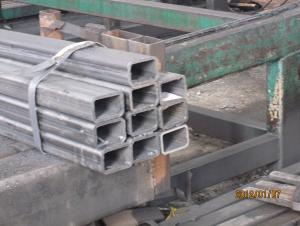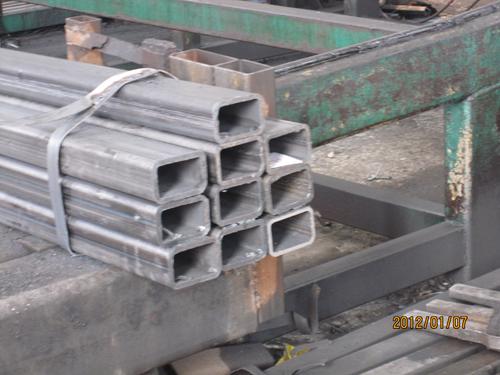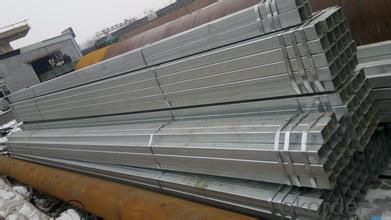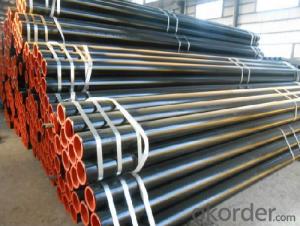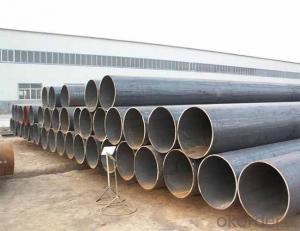steel pipe
- Loading Port:
- China Main Port
- Payment Terms:
- TT or LC
- Min Order Qty:
- -
- Supply Capability:
- -
OKorder Service Pledge
OKorder Financial Service
You Might Also Like
Packaging & Delivery
| Packaging Detail: | 1. In bundles by containers or in bulk 2. Oiled in bundles In bundles by containers or in bulk 3. Oiled with plastic sheet wrapped |
| Delivery Detail: | 10-30days |
Specifications
MS Square Pipe
1)Length:2-12Meter
2)Size:15*15mm-1000*1000mm
3)Wall thickness:0.8mm to12mm
Place or Origin: Tianjin China
FAQ of Steel Pipe
1)How is the quality of your products?
Our products are manufactured strictly according to national and internaional standard, and we take a test
on every pipe before delivered out. If you want see our quality certifications and all kinds of testing report, please just ask us for it.
Guaranteed: If products’ quality don’t accord to discription as we give or the promise before you place order, we promise 100% refund.
2)How about price?
Yes, we are factory and be able to give you lowest price below market one, and we have a policy that “ for saving time and absolutely honest business attitude, we quote as lowest as possible for any customer, and discount can be given according to quantity”,if you like bargain and factory price is not low enough as you think, just don’t waste your time.Please trust the quotation we would give you, it is professional one.
3)Why should you chose us?
Chose happens because of quality, then price, We can give you both.Additionally, we can also offer professional products inquiry, products knowledge train(for agents), smooth goods delivery, exellent customer solution proposals.Our service formula: good quality+good price+good service=customer’s trust
SGS test is available, customer inspection before shipping is welcome, third party inspection is no problem.
Any question, pls feel free to contact us !
- Q: Seamless steel tube DN15 specification phi 18*3 what do you mean?
- Seamless steel pipe having a hollow cross section, used as a conduit for conveying fluids, such as pipelines for transporting petroleum, natural gas, gas, water, and certain solid materials. Compared with solid steel such as round steel, steel tube is lighter in strength and equal in resistance to bending and torsion. It is an economical cross section steel and is widely used in the manufacture of structural and mechanical parts.
- Q: Can steel pipes be used for automotive applications?
- Yes, steel pipes can be used for automotive applications. Steel pipes are commonly used for various automotive components such as exhaust systems, fuel lines, and structural frames due to their high strength, durability, and resistance to corrosion. They provide reliable performance and are cost-effective in automotive manufacturing.
- Q: Can steel pipes be used for transporting hazardous materials?
- Yes, steel pipes can be used for transporting hazardous materials. Steel pipes are known for their strength, durability, and resistance to corrosion, making them suitable for handling various types of hazardous substances. Additionally, steel pipes can be designed to meet specific requirements, such as pressure ratings and chemical compatibility, ensuring the safe transport of hazardous materials. However, it is crucial to consider additional safety measures and comply with relevant regulations to minimize any potential risks associated with transporting hazardous materials.
- Q: How do steel pipes compare to other types of piping materials?
- Steel pipes are highly durable and have excellent strength, making them superior to other types of piping materials in terms of longevity and resistance to extreme conditions. They are also more cost-effective, as steel pipes require less maintenance and have a longer lifespan. Additionally, steel pipes have better corrosion resistance, making them ideal for various applications, especially in industries where chemical exposure is common.
- Q: How to distinguish between steel pipe and spiral pipe material?
- The alloy tube can be divided into: low alloy pipe, alloy pipe structure, high alloy tube, high strength tube. Bearing tube, heat resistant acid resistant stainless pipe, precision alloy (such as cutting alloy) pipe, high temperature alloy tube, etc..
- Q: What are the different types of steel pipe supports for high-temperature applications?
- Some different types of steel pipe supports for high-temperature applications include hangers, clamps, brackets, and anchors. These supports are designed to withstand the elevated temperatures and provide stability and proper alignment to the piping system.
- Q: Are steel pipes resistant to impact?
- Yes, steel pipes are generally resistant to impact due to their high strength and durability.
- Q: How do you calculate the flow velocity in a steel pipe?
- To calculate the flow velocity in a steel pipe, you need to consider the principles of fluid mechanics and apply relevant equations. The most commonly used equation to calculate flow velocity is the Bernoulli equation, which relates the pressure, velocity, and elevation of a fluid. First, you need to determine the volumetric flow rate (Q) of the fluid passing through the pipe. This can be done by measuring the mass flow rate (m) or the volumetric flow rate directly using a flow meter. Once you have the volumetric flow rate, you can proceed with calculating the flow velocity (V). The flow velocity (V) is obtained by dividing the volumetric flow rate (Q) by the cross-sectional area (A) of the pipe. The cross-sectional area of the pipe can be determined using the formula A = πr^2, where r is the radius of the pipe. Therefore, the formula to calculate the flow velocity (V) in a steel pipe is: V = Q / A Keep in mind that this calculation assumes an ideal flow condition and does not account for any frictional losses or other factors that may affect the flow. In real-world scenarios, it is essential to consider additional factors like pipe roughness, fluid viscosity, and pipe diameter to obtain a more accurate estimation of flow velocity.
- Q: What are the main components of a steel pipe?
- The main components of a steel pipe are the base metal, which is typically made of carbon steel or alloy steel, and the protective coating, which is applied to prevent corrosion and enhance durability. Additionally, joints or connections are important components that allow for the seamless connection of multiple pipes.
- Q: What's the use of steel pipe?
- No other type of steel can replace the steel tube entirely, but the steel tube can take the place of some sections and bars. Steel pipe is very important to the development of national economy and the improvement of human life quality, much better than other steel products. From the people's daily utensils, furniture, water supply and drainage, gas supply, ventilation and heating facilities to all kinds of agricultural machinery equipment manufacturing, underground resources development, national defense and space use guns, bullets, missiles, rockets and so cannot do without steel.
Send your message to us
steel pipe
- Loading Port:
- China Main Port
- Payment Terms:
- TT or LC
- Min Order Qty:
- -
- Supply Capability:
- -
OKorder Service Pledge
OKorder Financial Service
Similar products
Hot products
Hot Searches
Related keywords
